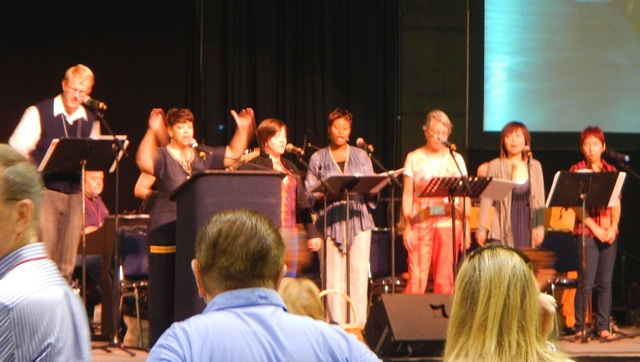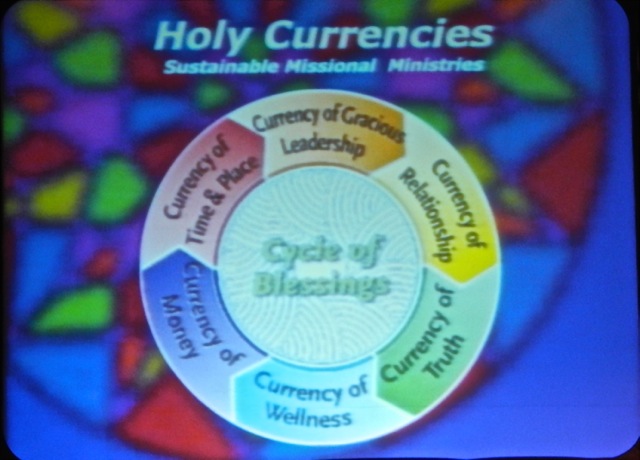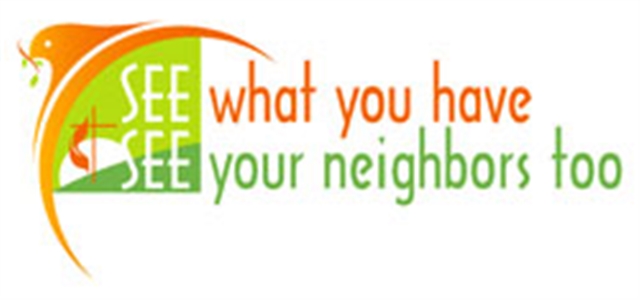 Annual Conference 2013 Day 1 journal
Annual Conference 2013 Day 1 journal
This is the first of four journal entries from the Annual Conference Session 2013 by Nick Strobel. Those interested in the results of the legislative resolutions can skip to the day 3 journal. Consider this a sort of personal journal of my thoughts and experiences at the ACS with a separate journal report for each day.
The praise team led by Dr. Lisa Allen from the Interdenominational Theological Seminary (also pictured at right) opened the ACS 2013 with two songs we need to use at Wesley UMC: "Bring Forth the Kingdom of God" (#2190 in Faith We Sing ) and "Bring Us Home" by Rodney Romney. The link to "Bring Us Home" is to Romney's Rubrics page of why he wrote that hymn (it's a powerful story, so be sure to check it out!). Perhaps we could use "Bring Us Home" in the first Sunday of our return to the regular worship/Sunday school schedule. |
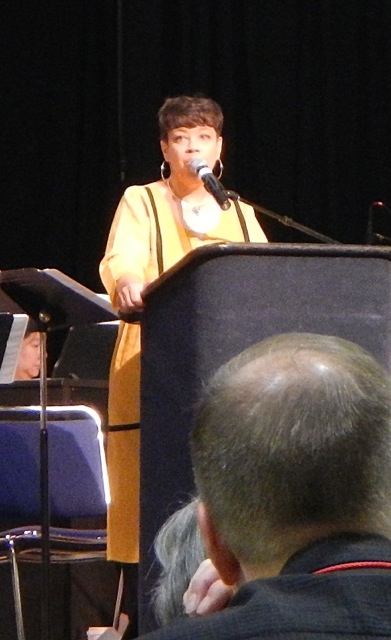 |
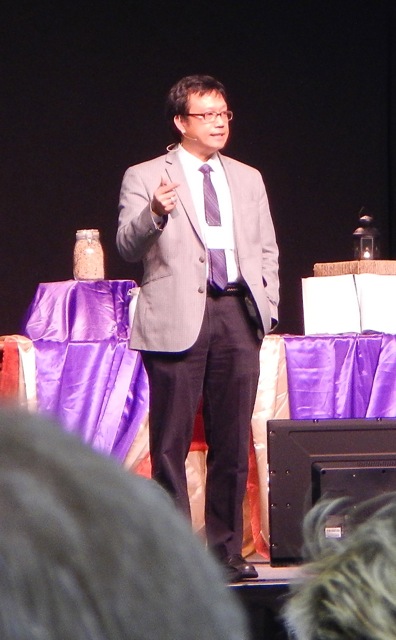 |
Dr. Eric Law of the Kaleidoscope Institute was the main speaker for ACS 2013. He introduced the concept of Holy Currencies for creating ministries that are missional AND sustainable. |
Some things leaders do to be rejuvenated at their meetings instead of being drained:
- They encourage others to participate and other people DO participate (enables the leader to rest while the others are talking)
- Helping others in the meeting in some way, e.g., in teaching them something (leaders get back energy, sense of satisfaction from the giving)
- Teaching new things
- They trust that others will get to where they need to go and not be so worried/stressed about making sure the other people do a particular task in a particular way. ("Let go, let God")
Gracious leaders are those who “lead like water” so there is a flow and cycling from leaders to followers to leaders again.
Eric Law also talked about the three degrees of influence each of us has: friend of a friend of a friend. So how we behave around our circle of friends actually has a wider influence. Will we have a positive influence or a negative influence? (See a recent NPR report on how the attitude of one new college room mates can affect the other's mental health for one example.)
Internal and external networks: we need to have networks to connect to the outside world (that outside of the church) as well as have a tight loving community inside the church. How do we have both networks?
Regarding the internal network, address these questions: How do you communicate internally? How are decisions made? How much understanding is there among the members? How many people are making the decisions (a few or many)? In the currency of relationships, the “exchange” of the currency (analogous to money currency) for good relationship practices among the church members is that new leaders develop, more relationships are made, and there is more truth-speaking. Another example of the usage of the term “exchange” in this context of currency is when asked what does this Annual Conference session exchange into, one would say that the Annual Conference Session could exchange into new leaders.
Regarding the external network: they are the non-members, people of different racial/ethnic/socio-economic backgrounds than your group. A positive exchange of the currency of relationships with the external network is that the non-members can be your resources to accomplish ministry in the world. Also the external network can see things we miss seeing (because of our internal blinders); they may know things that could save your life! Also, do you know who are the resource providers in your community (e.g., job providers)? Many wealthy people want to give from their abundance but they don't know who to trust with their gifts of money.
On the topic of cultural make-up, realize that each person is made of many cultural components: people experience the same events differently and they come from experiences where they were treated differently than you were or would have been. Examples of different cultural components include: age, gender, physical ability, mental ability, skin color, racial background, ethnic background, married status, sexual orientation, migration history (either personal or ancestor), military experience, education levels, religion, profession, adopted as child or raised with biological parents, nationality, being a parent, medical condition, theology, language, geographic location, birth order, abuse experience, addiction (and other groupings). One example he used to clarify how skin color or racial group might not be a sufficient enough to group a person, consider Pres. Obama. His skin color is brown and his race is African-American but his ethnic background is Hawaiian and Indonesian).I-Relate.org workshop at laity session
The i-Relate.org ministry team led a workshop on Culturally Mindful Leadership at the laity session. When we interact with somebody we don't know: We need to expect that something positive is going on (the other person is acting respectfully according to his/her culture)—that expectation will help you discover how people with different backgrounds/cultures interact.
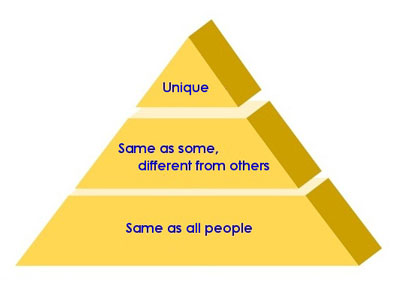 There are three aspects of a person. If we draw the aspects as a pyramid, there is one aspect at the top of the pyramid that is unique to that person, another aspect at the base of the pyramid that is the same as all people (example biology), and the middle level is that we share with some and different from others. It is the middle level that is the cultural part—that gives us a sense of belonging to a group or tribe.
There are three aspects of a person. If we draw the aspects as a pyramid, there is one aspect at the top of the pyramid that is unique to that person, another aspect at the base of the pyramid that is the same as all people (example biology), and the middle level is that we share with some and different from others. It is the middle level that is the cultural part—that gives us a sense of belonging to a group or tribe.
One exercise the i-Relate.org team had us do was to have us recall one experience when were excluded and then find one word that would describe our feelings at that exclusion. We then greeted those around us with “Hi! My name is <that one feeling word>”. Then they had us recall one experience when were definitely included and find the one word that would describe our feelings. We again greeted those around us but using the one feeling word of inclusion, “Hi! My name is <inclusion feelings word>”.
Problems arise when we think our particular group is better than other groups.
Another member of the team described the “ethnocentric glasses” she (like the rest of us) wears. People of different backgrounds will usually have the same intention of being respectful of the other person but the behavior is different. As an example, she described the difference of respectful Korean eating of rice in contrast to respectful Chinese eating of rice that arises from the difference in the type of rice or style of cooking. Chinese rice is not sticky so it does not clump up. Therefore, proper Chinese manners for eating rice has the person holding the bowl up close to their mouth as they put rice into their mouths while proper Korean manners for eating rice has the person keeping the bowl on the table well away from their mouth and transferring the rice over a larger distance from bowl to mouth. Growing up Korean, she was initially appalled at the manners of the patrons of a restaurant she visited when she was in Hong Kong.
We watched a two-minute video describing the difference between cultures where relationship building is the key or most important thing and cultures where time or a task is the most important thing. As an example in Mexico, the key is relationship building, so it is of primary importance and a sign of respect to "chit-chat" and be in conversation. In New York, however, the people value getting to the point in as short a time as possible—state your business and move on as quickly as possible.
When we interact with someone of a different culture we have a choice between building a relationship and working to understand the other person or choosing to think the other person is an idiot or a troublemaker.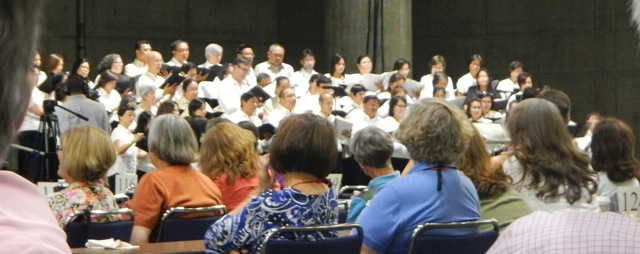
Filipino Centennial Choir at evening Communion Service
(this is the 100th year of Filipino ministry in our Annual Conference)
In the evening Communion Worship service, Eric Law used the story of the miracle of the feeding of the 5000 as the scripture text. He noted that the world tells us that there is not enough, so we must take and keep the resource to ourselves. However, in his proper Hong Kong family growing up, he learned that it is better to have less than the other. There was always enough left over at a dinner meal because everyone would refuse to eat the last serving left of the food, saying that another member of the family needed that last serving for some task they were going to do tomorrow or because of something they did that day or for some other reason. That was the ritual of that culture. Therefore, it seemed for him growing up that there was always enough food to go around!
The ones who are healthy spiritually/emotionally are the ones who give away what they have because in the process of doing so, they are making connections with people.
Eric Law proposed a different sort of giving challenge for a church. He proposed that instead of the church spending money on itself or some particular church ministry program, that each member of the church be given $20 with the instruction that each person must spend that $20 at a locally-owned business or businesses that contribute the most to the community. Those locally-owned businesses that give back to the community are also those that hire local people and keep their profits in the local community rather than sending it off to some outside corporate office. Therefore, that $20/member spent at those businesses will be $20/member that flows in the community and has a great deal of positive influence. If the community is aware of what the church is doing in such a giving campaign, the community will give back to the church when the church needs help—money flows instead being dammed up somewhere.
The song we sang after communion was "Table of Plenty" by Dan Schutte in Worship & Song book #3173 and also at spiritandsong.com or ocp.org .
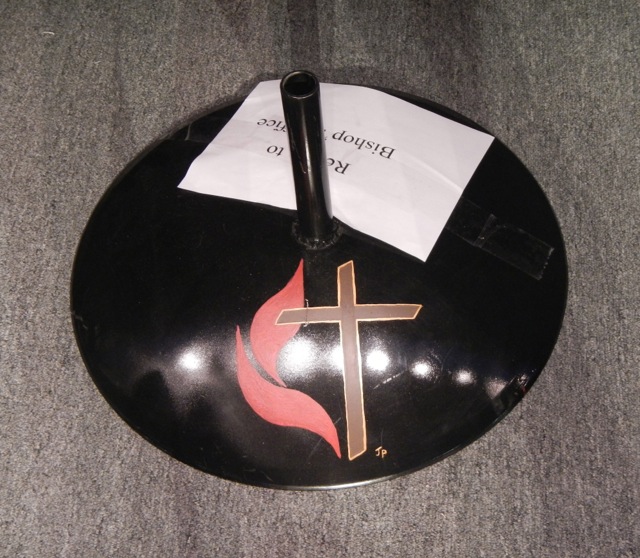
The stand for the Bishop's shepherd crook staff has a connection to Wesley UMC. See the "JP" just below cross? That's our own Jim Pugh who created the stand from a disk used in plowing fields.
